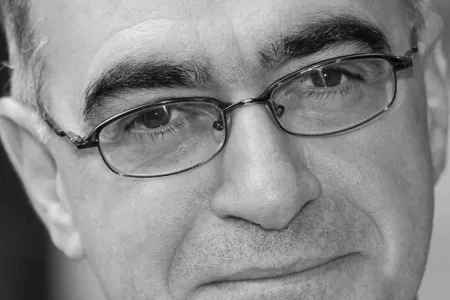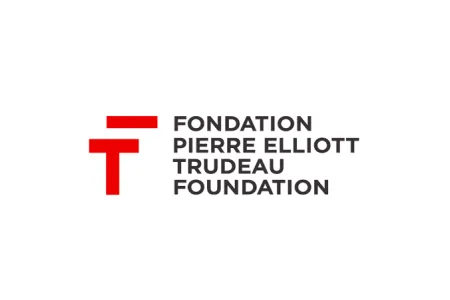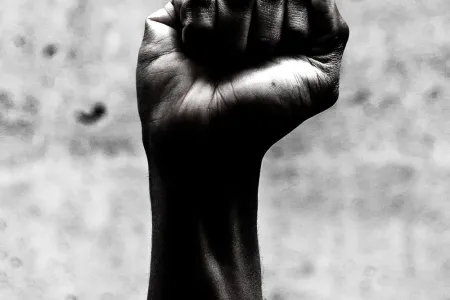Displaying results 91 - 100 of 1066

Margarida Garcia, Sophie Thériault, Sophie de Saussure: Creating a New Future for Research in Law
What are the challenges of legal research in the 21st century? To answer this question, the University of Ottawa's Faculty of Law organized the first Autumn School on the Methodology of Research in Law. Three members of the Pierre Elliott Trudeau Foundation community contributed to the discussion. As a professor and vice-dean of research and communications at the University of Ottawa's Faculty of Law, 2004 Foundation scholar Margarida Garcia emphasized the significance of critical outlooks as well as scientific methods, while raising the controversial question of normativity. Professor and 2003 Foundation scholar Sophie Thériault spoke to the lack of reflexivity in the 21st century's hyperactive academic world. Finally, 2017 Foundation scholar Sophie de Saussure asserted how important the researcher’s role and place in society was, and how it should be included at the heart of contemporary legal research.
Watch the video-summary of the first Autumn School on the Methodology of Research in Law for an overview of the discussions that unfolded during the event.
Watch the video-summary of the first Autumn School on the Methodology of Research in Law for an overview of the discussions that unfolded during the event.

Laure Waridel Joins Trudel Johnston & Lespérance
Congratulations to 2011 Foundation scholar Laure Waridel, who joined forces with class action firm Trudel Johnston & Lespérance on 14 June 2018. As special advisor in social justice and environmental matters, Laure will contribute her expertise and experiences to making Canada a fairer and more environmentally sustainable society. Waridel’s decision to join the firm was motivated by Trudel Johnston & Lespérance’s strong leadership in public interest cases on a pro bono basis and its citizen-oriented business model. All our best to Laure!

Meet the 2018 scholars
Montréal, QC, 21 June 2018 – The Pierre Elliott Trudeau Foundation is proud to present the 2018 recipients of its unique doctoral scholarship in the social sciences and humanities. From British Columbia to Quebec, reaching to the United States and the United Kingdom, the fifteen newly-appointed scholars are exceptional students who have distinguished themselves through academic excellence and civic engagement. Focusing on important questions for Canada and the world, they are researching areas as diverse as literature, environmental sciences, urban planning, archeology, public health, communications, public health, education, political science, and law. The cohort joins a multidisciplinary network of over 400 researchers, outstanding intellectuals, and seasoned decision-makers committed to applying their knowledge and skills to pressing Canadian and global issues.

Meet the 2018 fellows
Montreal, 26 June 2018 – The Pierre Elliott Trudeau Foundation is proud to announce the 2018 recipients of its annual research fellowships. Every year, the Foundation awards up to five fellowships to intellectuals in the humanities and social sciences who are recognized for their productivity, their commitment to communicating their findings to the public, and their ability to devise innovative solutions to some of the major issues facing Canada and the world.

Billy-Ray Belcourt Wins the 2018 Griffin Poetry Prize
On 7 June 2018, 2018 Foundation scholar Billy-Ray Belcourt received the $65,000 Griffin Poetry Prize for his debut collection of poems, This Wound is a World, becoming the youngest winner in the prize’s history. Blending the codes of love song, elegy, prayer, and manifesto, Billy-Ray’s poetry evokes the intimacy and violence of Indigenous embodied experiences in Canada. In its citation, the Griffin Trust judging panel praised the collection of poems as a “politically necessary” meditation on queerness, Indigeneity, rebellion, and survival. Congratulations, Billy-Ray!
Learn about the Griffin Poetry Prize and read an excerpt of Billy’s collection of poems here. Order This Wound is a World in paperback here.
Learn about the Griffin Poetry Prize and read an excerpt of Billy’s collection of poems here. Order This Wound is a World in paperback here.

Alain-G.Gagnon receives the insignia of the Ordre de la Pléiade
On July 12, 2018, Alain-G. Gagnon, 2010 Foundation fellow, received the insignia of the Ordre de la Pléiade (French only) from the President of the National Assembly of Quebec and President of the Assemblée parlementaire de la Francophonie, Jacques Chagnon.
The Ordre de la Pléiade recognizes people who particularly distinguish themselves in the promotion of democracy, the rule of law, human rights, and allow for the prospering of the French language and cultural diversity around the world.
Congratulations!
The Ordre de la Pléiade recognizes people who particularly distinguish themselves in the promotion of democracy, the rule of law, human rights, and allow for the prospering of the French language and cultural diversity around the world.
Congratulations!

Scholarship
The Pierre Elliott Trudeau Foundation Scholarship brings remarkable individuals from various disciplines and backgrounds into a life-changing community with a shared interest in making Canada and the world a better place.

Seeking a Northern Perspective
The Future Forums touched down in Yellowknife for what turned into a rich, even moving set of discussions about the meaning of Inclusive Excellence and Engaged Leadership in the context of the Canadian North.
“So much love, inspiration & power coming from these strong female Indigenous leaders!” Pierre Elliott Trudeau Foundation CEO Pascale Fournier tweeted following the session.
During the meeting, Dr. Fournier indicated the Foundation is working to involve more people from the North in its activities.
“When you look at the North, and the Northwest Territories, there is big under-representation. I am not comfortable with that,” she told the group assembled at Yellowknife City Hall.
Participants weighed in with a variety of viewpoints on leadership. Hovak Johnston, who is behind the Inuit Tattoo Revitalization project, a project focused on the empowerment of women, said inclusion is key to effective leadership.
“To be a good leader you need to be mindful of all the people around you,” she said. “If you don’t have strong community, you can’t have a strong leader.”
Joe Handley is a former Premier of the Northwest Territories. He observed that engaged leadership is about stepping beyond what is customarily expected in much of society.
“It isn’t just about the elected leaders or the formal leaders. It is everyone,” he said. Handley pointed to Indigenous elders who have much wisdom and knowledge to share, but whose views can be overlooked.
“Too often we are too busy, and we don’t take the time to listen to people when they express themselves in a traditional way. It takes time. We have to listen, and not just speak.”
“So much love, inspiration & power coming from these strong female Indigenous leaders!” Pierre Elliott Trudeau Foundation CEO Pascale Fournier tweeted following the session.
During the meeting, Dr. Fournier indicated the Foundation is working to involve more people from the North in its activities.
“When you look at the North, and the Northwest Territories, there is big under-representation. I am not comfortable with that,” she told the group assembled at Yellowknife City Hall.
Participants weighed in with a variety of viewpoints on leadership. Hovak Johnston, who is behind the Inuit Tattoo Revitalization project, a project focused on the empowerment of women, said inclusion is key to effective leadership.
“To be a good leader you need to be mindful of all the people around you,” she said. “If you don’t have strong community, you can’t have a strong leader.”
Joe Handley is a former Premier of the Northwest Territories. He observed that engaged leadership is about stepping beyond what is customarily expected in much of society.
“It isn’t just about the elected leaders or the formal leaders. It is everyone,” he said. Handley pointed to Indigenous elders who have much wisdom and knowledge to share, but whose views can be overlooked.
“Too often we are too busy, and we don’t take the time to listen to people when they express themselves in a traditional way. It takes time. We have to listen, and not just speak.”

The Challenge of Inclusion
Participants at the Pierre Elliott Trudeau Foundation Future Forums in Calgary tackled the consultation’s two tough issues head-on.
Inclusive Excellence and Engaged Leadership were discussed in order to gather insights and opinions on how the Foundation can help foster better inclusiveness through leadership in Canada.
Foundation President and CEO, Pascale Fournier, set the stage for the discussion by getting straight to the point when it comes to the idea of Inclusive Excellence:
“Why is it that some people are never at the table? And what can we do to get them to come to the table?” Fournier asked the participants.
There was general agreement that the issue is multi-faceted and there are no easy answers. Another consensus in the room at the Calgary Municipal Complex was that actions can be taken to bring positive change, and the conversation brought forward in the Future Forums is a good start.
Lorelei Higgins is the Indigenous Relations Strategist with the City of Calgary. She says the goal of inclusiveness requires people from different backgrounds and cultures finding new common ground.
Higgins also pointed out systemic, institutional hierarchy can alienate people who don’t feel as though their views are valued.
“As long as we keep thinking of leadership by titles or by degrees, we are going to leave people out,” she said.
The Future Forums consultation in Calgary was hosted by Mayor Naheed Nenshi, who participated throughout the discussion period.
“Being a leader in a place of great diversity is at top of mind for me,” Mayor Nenshi said during closing remarks.
He spoke hopefully about opportunities to be part of the community and the decision-making process. Mayor Nenshi described one specific way he believes people can get involved right away: by taking up volunteering at least three times per year.
Inclusiveness is important, he said, “in order to ensure every person in this land has the opportunity to live this great Canadian life.”
Inclusive Excellence and Engaged Leadership were discussed in order to gather insights and opinions on how the Foundation can help foster better inclusiveness through leadership in Canada.
Foundation President and CEO, Pascale Fournier, set the stage for the discussion by getting straight to the point when it comes to the idea of Inclusive Excellence:
“Why is it that some people are never at the table? And what can we do to get them to come to the table?” Fournier asked the participants.
There was general agreement that the issue is multi-faceted and there are no easy answers. Another consensus in the room at the Calgary Municipal Complex was that actions can be taken to bring positive change, and the conversation brought forward in the Future Forums is a good start.
Lorelei Higgins is the Indigenous Relations Strategist with the City of Calgary. She says the goal of inclusiveness requires people from different backgrounds and cultures finding new common ground.
Higgins also pointed out systemic, institutional hierarchy can alienate people who don’t feel as though their views are valued.
“As long as we keep thinking of leadership by titles or by degrees, we are going to leave people out,” she said.
The Future Forums consultation in Calgary was hosted by Mayor Naheed Nenshi, who participated throughout the discussion period.
“Being a leader in a place of great diversity is at top of mind for me,” Mayor Nenshi said during closing remarks.
He spoke hopefully about opportunities to be part of the community and the decision-making process. Mayor Nenshi described one specific way he believes people can get involved right away: by taking up volunteering at least three times per year.
Inclusiveness is important, he said, “in order to ensure every person in this land has the opportunity to live this great Canadian life.”

Reconciling Knowledge
Impassioned discussions took place among participants who brought a wide range of experiences and knowledge to the Pierre Elliott Trudeau Foundation’s Future Forums consultation in Whitehorse on Tuesday. One major theme which emerged from the discussions was knowledge inclusion, and how some forms of knowledge are systematically left on the sidelines both in the academic world, and in general society.
Mathieya Alatini, past Chief of Kluane First Nation, said even as the Foundation seeks insights at the Future Forums on Inclusive Excellence and Engaged Leadership, the organization itself needs to look in the mirror.
“The Foundation can appear more exclusive, by design,” she noted, observing one key to Inclusive Excellence is “understanding different ways of learning, of being, and seeking awareness.”
Peter Johnston is Grand Chief of the Council of Yukon First Nations. He expressed optimism some of the right steps are being taken toward reconciliation between Indigenous and non-Indigenous communities. But he warned there remains much work to do after hundreds of years of Indigenous culture, knowledge, and stories being ignored.
“In the development of Canada as a country, these were put to the side, supressed,” Grand Chief Johnston told the group.
He applauded Yukon College for being a leader in helping to ensure “kids going to school in these institutions see their own values being taught.”
Margaret Dumkee is Dean of Yukon College, which is poised to become the first full-fledged university in Canada’s North. She said the inclusion of all forms of knowledge must be a priority. “Before we can build reconciliation we have to build the truth,” Dean Dumkee said.
Pascale Fournier, President and CEO of the Pierre Elliott Trudeau Foundation, applauded the heart-felt, sometimes blunt observations which were brought forward throughout the session on Tuesday.
“Ideas are great, but ideas mean nothing if they don’t come from the heart,” she said.
Mathieya Alatini, past Chief of Kluane First Nation, said even as the Foundation seeks insights at the Future Forums on Inclusive Excellence and Engaged Leadership, the organization itself needs to look in the mirror.
“The Foundation can appear more exclusive, by design,” she noted, observing one key to Inclusive Excellence is “understanding different ways of learning, of being, and seeking awareness.”
Peter Johnston is Grand Chief of the Council of Yukon First Nations. He expressed optimism some of the right steps are being taken toward reconciliation between Indigenous and non-Indigenous communities. But he warned there remains much work to do after hundreds of years of Indigenous culture, knowledge, and stories being ignored.
“In the development of Canada as a country, these were put to the side, supressed,” Grand Chief Johnston told the group.
He applauded Yukon College for being a leader in helping to ensure “kids going to school in these institutions see their own values being taught.”
Margaret Dumkee is Dean of Yukon College, which is poised to become the first full-fledged university in Canada’s North. She said the inclusion of all forms of knowledge must be a priority. “Before we can build reconciliation we have to build the truth,” Dean Dumkee said.
Pascale Fournier, President and CEO of the Pierre Elliott Trudeau Foundation, applauded the heart-felt, sometimes blunt observations which were brought forward throughout the session on Tuesday.
“Ideas are great, but ideas mean nothing if they don’t come from the heart,” she said.

